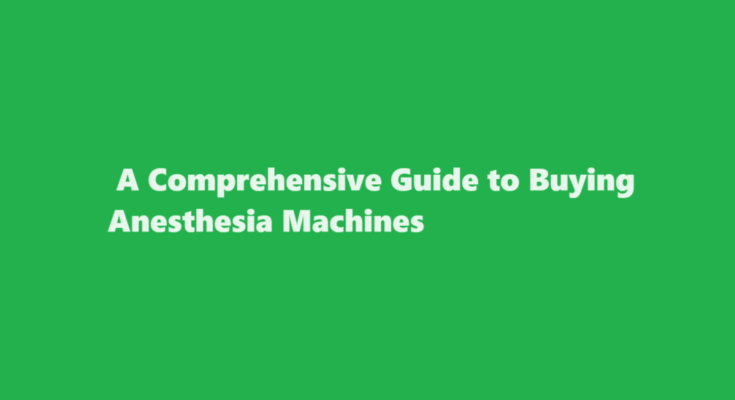Introduction
Purchasing anesthesia machines is a critical decision for any healthcare facility, as these devices play a vital role in ensuring patient safety during surgical procedures. Selecting the right anesthesia machine is a complex process that requires careful consideration of various factors. In this article, we will provide a comprehensive guide on how to buy anesthesia machines, covering key aspects that need to be taken into account to make an informed decision.
Determine Your Facility’s Needs
The first step in buying anesthesia machines is to understand your facility’s unique requirements. Consider the following factors
a. Case Load: Evaluate the number and types of surgical procedures performed in your facility. A high case load facility might require more advanced anesthesia machines with greater flexibility and features.
b. Anesthesia Techniques: Different anesthesia machines cater to various anesthesia techniques, including inhalation, intravenous, or regional anesthesia. Identify the primary methods used in your facility.
c. Patient Population: Consider the demographics of the patients you serve, such as age, health status, and specific medical conditions. This will help determine the level of sophistication needed in your anesthesia equipment.
d. Budget: Define a clear budget to work within. Anesthesia machines come in various price ranges, and knowing your financial constraints will guide your selection process.
Compliance and Safety Standards
Anesthesia machines are subject to stringent regulatory and safety standards. Ensure that the machines you consider comply with the necessary requirements, including those from organizations like the U.S. Food and Drug Administration (FDA) and the European Medicines Agency (EMA). Safety features are crucial, so prioritize machines equipped with alarms and monitoring systems that meet or exceed industry standards.
Evaluate Anesthesia Machine Types
There are different types of anesthesia machines available, and selecting the right one depends on your facility’s needs. The three main types are
a. Standalone Machines: These are compact, portable, and suitable for small clinics or facilities with low caseloads. They are cost-effective but may lack some advanced features.
b. Workstation Machines: Workstation machines are more comprehensive and come with built-in vaporizers, monitors, and ventilators. They are versatile and can serve a wide range of surgical procedures.
c. Modular Machines: Modular anesthesia machines allow for customization by adding or removing components to suit specific needs. They are ideal for facilities with varying requirements and caseloads.
Key Features to Consider
When buying anesthesia machines, consider the following essential features
a. Ventilator System: Ensure the machine comes with a high-quality ventilator system that can deliver precise tidal volumes and accommodate various patient types.
b. Monitoring Capabilities: Look for machines equipped with comprehensive monitoring features, such as ECG, SpO2, and capnography, to ensure patient safety during surgery.
c. Vaporizers: Choose machines with vaporizers that offer accuracy and consistency in delivering anesthetic agents.
d. Gas Supply: Check if the machine supports a variety of gas sources and is compatible with your facility’s gas supply system.
e. Mobility and Portability: Consider the ease of moving the machine within your facility, as well as its adaptability to different surgical settings.
f. Waste Gas Scavenging: Ensure the machine has an effective waste gas scavenging system to remove exhaled anesthetic gasses and prevent exposure to healthcare providers.
Brand Reputation and Support
When buying anesthesia machines, opt for reputable brands with a history of quality and reliability. Research and read customer reviews to gain insights into the performance and durability of specific models. Additionally, assess the availability of technical support, spare parts, and service contracts, as ongoing maintenance and support are crucial for the long-term functionality of the equipment.
Training and User-Friendliness
Consider the ease of use and availability of training for your staff. Anesthesia machines should be user-friendly and intuitive, with the manufacturer offering training and educational resources to ensure proper operation and safety.
Future-Proofing
Investing in anesthesia machines is a long-term commitment. Therefore, consider the machine’s ability to adapt and upgrade with changing technology and regulations. Ask about the machine’s compatibility with future software updates and enhancements.
Warranty and Maintenance
Review the warranty terms and conditions provided by the manufacturer. Ensure that it covers essential components and offers sufficient duration. Establish a clear maintenance schedule to keep the anesthesia machines in optimal working condition and extend their lifespan.
FREQUENTLY ASKED QUESTIONS
How much does a GE anesthesia machine cost?
GE Aisys CS2 is one of the 25 best-selling Anesthesia Machines. The Current Price Range Based on 5 Vendors on Bimedis. It’s Costs Starts Approximately at $9,027 and ends at the Highest Price $25,000. The Average Price for GE Aisys CS2 – $26,592 Based on 14 Listings of This Product.
What machine is used for anesthesia?
In the developed world, the most frequent type in use is the continuous-flow anesthetic machine or “Boyle’s machine”, which is designed to provide an accurate supply of medical gasses mixed with an accurate concentration of anesthetic vapor, and to deliver this continuously to the patient at a safe pressure and flow.
Conclusion
Buying anesthesia machines is a significant decision for any healthcare facility, impacting patient safety and the efficiency of surgical procedures. To make an informed choice, consider your facility’s specific needs, compliance with safety standards, and the types and features of anesthesia machines available. Additionally, reputation, user-friendliness, and long-term support are vital factors that should influence your decision. By carefully evaluating these aspects, you can select the right anesthesia machines that best suit your facility’s requirements and budget, ultimately ensuring the safety and well-being of your patients.
Read Also : Perfecting Pork Butt – Smoking Time for Tender Perfection at 225°F



